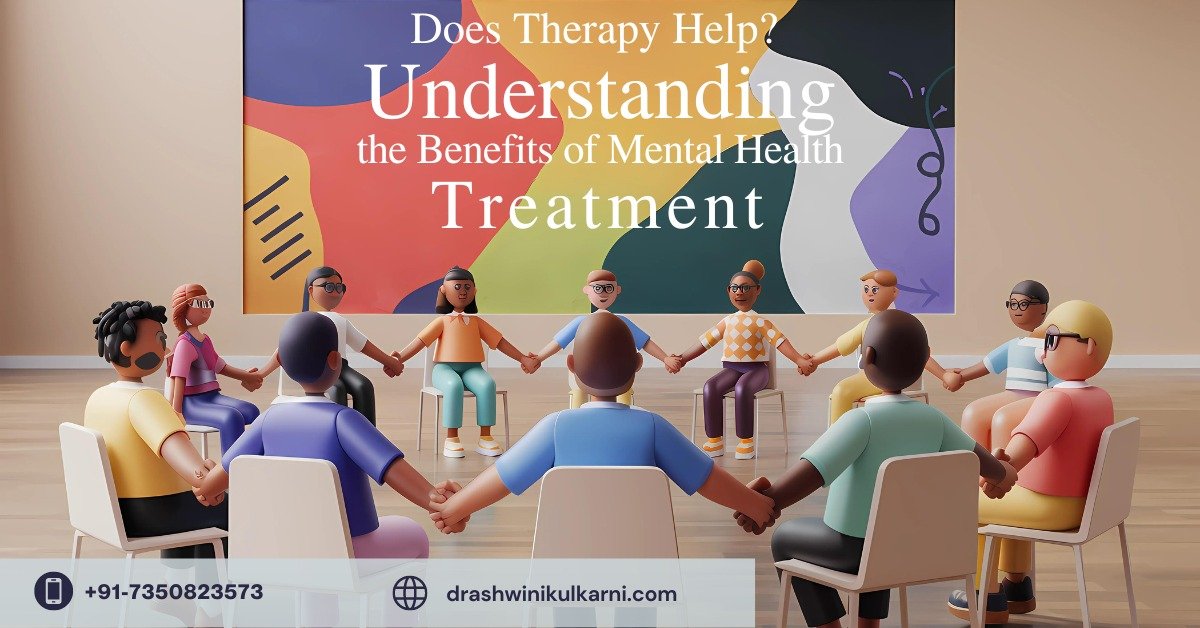Does Therapy Help? Understanding the Benefits of Mental Health Treatment

01
Oct
Does Therapy Help? Understanding the Benefits of Mental Health Treatment
In today’s fast-paced world, mental health has become a topic of increasing importance. With rising stress levels and societal pressures, many individuals find themselves seeking help. One of the most effective ways to address mental health issues is through therapy. But the question remains: does therapy really help?
The Purpose of Therapy
Therapy, or psychotherapy, is a collaborative treatment based on the relationship between an individual and a trained mental health professional. Its primary goal is to help individuals understand their feelings, behaviours, and thoughts, enabling them to make positive changes in their lives. Therapists utilize various techniques to address a range of mental health concerns, including anxiety, depression, trauma, and relationship issues.
Benefits of Therapy
- Enhanced Self-Understanding: One of the most significant benefits of therapy is gaining insights into one’s thoughts and behaviours. This increased self-awareness can lead to better decision-making and improved emotional regulation.
- Improved Coping Skills: Therapy equips individuals with effective coping strategies to handle life's challenges. Whether it’s dealing with stress at work or navigating personal relationships, having a set of tools can make a substantial difference.
- Supportive Environment: A therapist provides a safe and confidential space where individuals can express their feelings without judgment. This support can be invaluable, especially for those who may not have a strong support system in their personal lives.
- Overcoming Trauma: For those dealing with past traumas, therapy can be a critical component of healing. Through various therapeutic approaches, individuals can process their experiences and develop healthier coping mechanisms.
- Behavioural Change: Therapy can facilitate behavioural changes that positively impact daily life. For example, cognitive-behavioral therapy (CBT) is particularly effective in helping individuals reframe negative thought patterns, leading to improved emotional responses.
Different Types of Therapy
There are various forms of therapy, each tailored to meet different needs:
- Cognitive-Behavioural Therapy (CBT): Focuses on identifying and changing negative thought patterns and behaviours.
- Dialectical Behavior Therapy (DBT): Combines CBT with mindfulness strategies, often used for individuals with emotional regulation issues.
- Psychodynamic Therapy: Explores unconscious patterns and past experiences to understand current behaviour.
- Humanistic Therapy: Emphasizes personal growth and self-actualization, fostering a sense of empowerment.
Finding the best psychiatrist in Pune who specialises in these types of therapy can make a significant difference in treatment outcomes.
Common Misconceptions About Therapy
Despite its benefits, therapy is often surrounded by misconceptions:
- Therapy is Only for Severe Mental Illness: Many believe that therapy is only for those with serious mental health conditions. In reality, therapy can benefit anyone experiencing stress, relationship issues, or a desire for personal growth.
- Therapists Provide All the Answers: Therapy is a collaborative process. While therapists guide individuals in their journey, the real work comes from the individuals themselves.
- It’s a Quick Fix: Therapy is not a one-size-fits-all solution or a quick fix. It requires commitment and time, with progress often being gradual.
Evidence Supporting Therapy
Numerous studies highlight the effectiveness of therapy. Research indicates that therapy can lead to significant improvements in symptoms of depression and anxiety. For instance, a meta-analysis published in the American Journal of Psychiatry found that individuals who engaged in therapy showed substantial reductions in symptom severity compared to those who did not receive treatment.
Moreover, the World Health Organization (WHO) recognizes psychotherapy as an effective treatment for various mental health disorders. By addressing emotional and psychological needs, therapy not only improves mental well-being but can also enhance physical health, leading to overall life satisfaction.
Choosing the Right Therapist
When considering therapy, it's essential to find the right mental health professional. Here are a few tips for choosing the best psychiatrist in Pune:
- Credentials and Specialization: Look for a psychiatrist with the appropriate qualifications and experience in the specific area you wish to address.
- Personal Fit: It’s vital to feel comfortable with your therapist. The therapeutic relationship can significantly influence the success of treatment.
- Approach and Techniques: Different therapists use various techniques. Research their approach to ensure it aligns with your needs.
Conclusion
In conclusion, therapy is a valuable tool for anyone looking to improve their mental health and overall quality of life. By offering support, enhancing self-understanding, and equipping individuals with coping skills, therapy can lead to lasting change. If you’re considering therapy, finding the best psychiatrist in Pune can help ensure you receive the guidance and support you need. Remember, reaching out for help is a brave first step towards healing and growth.
FAQs About Therapy
1. How long does therapy typically last?
The duration of therapy varies based on individual needs and goals. Some may benefit from just a few sessions, while others might engage in therapy for several months or even years, depending on the complexity of their issues.
2. What should I expect during my first therapy session?
In your first session, the therapist will typically ask about your background, reasons for seeking therapy, and any specific concerns you have. This initial discussion helps establish a foundation for your treatment.
3. Is therapy confidential?
Yes, therapy is confidential. Therapists are bound by ethical guidelines to protect your privacy. However, there are some exceptions, such as when there is a risk of harm to yourself or others.
4. Can I do therapy online?
Yes, online therapy has become increasingly popular and effective. Many therapists offer virtual sessions, allowing for flexibility and accessibility regardless of your location.
5. How do I know if therapy is right for me?
If you're experiencing persistent feelings of sadness, anxiety, or overwhelm, or if you're facing challenges in your relationships or work, therapy can be a beneficial option. It’s worth considering if you’re looking for support or personal growth.
